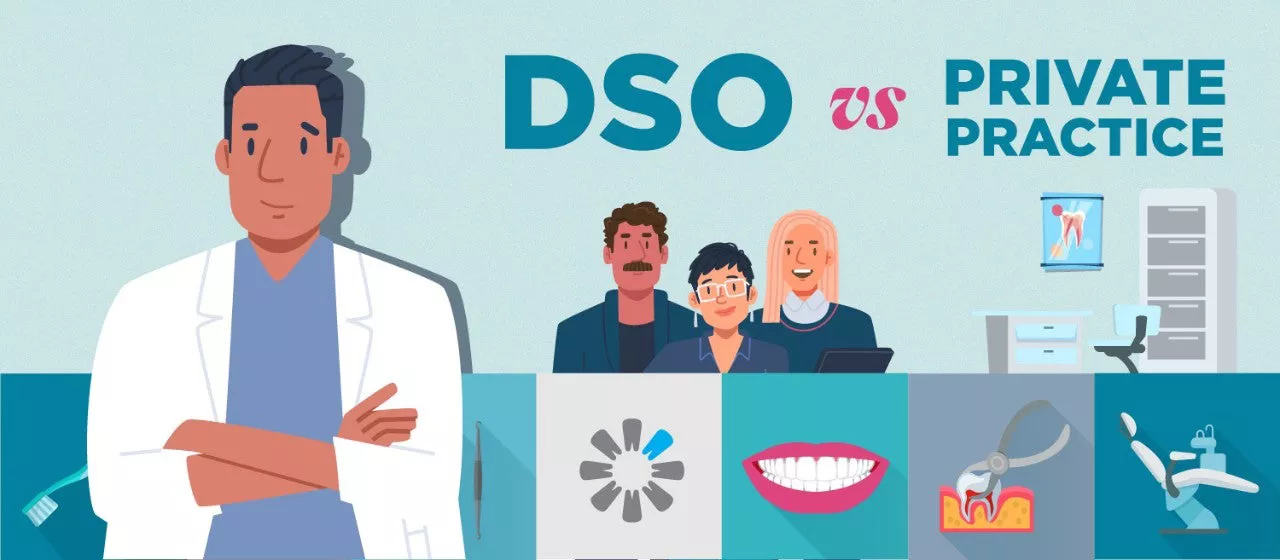Running a dental office has many different components that include more than just patient care. While passionate dental professionals hold patients as the highest priority, the business side of a dental practice cannot be neglected. To provide both a fully functional dental office along with high-quality patient-centered care, many dentists opt to join a Dental Support Organization, or DSO, instead of running a private practice by themselves or with a small group of dental partners.
In fact, according to the American Dental Association, 13.3% of female dentists and 8.7% of male dentists choose to join a DSO.
To know whether a DSO vs. a private practice is right for you, weighing both positives and negatives will help paint a clearer picture of which dental practice will best serve your needs.
What is a Dental Support Organization?
A DSO is a large dental group that has systems in place to provide dental practice owners with the following:
Support in office management
Marketing to potential patients
Clinical support, access to proven technology, post-graduate clinical training, and competitive benefits for you and your staff
The ADSO® (Association of Dental Support Organizations) adds that by providing various non-clinical services for dentists, DSOs make it easier for clinicians to run their practice. With services such as facility maintenance to human resources to compliance, and much more being supported through the DSO, dentists can keep their focus on patient care. In addition, DSOs also provide access to new, proven technology and training, provide greater economies of scale to secure vendor discounts, and increase the flexibility to schedule clinical time to accommodate patients' work and life schedules. Moreover, DSOs make it possible for dentists to participate in more insurance plans, increasing the access of high-quality services that patients can afford.
Not all DSOs are alike and can take different forms based on the desires of the current practice owner or which state the practice is located in. DSOs sometimes will build and open new offices and staff the dental practices. Other DSOs purchase private practices with the goal of keeping the dental staff and former dentist owner employed at the practice.
If you are a new graduate or working as an associate in another DSO or private practice and want to own your practice, a DSO can help. DSOs help you get started on this path by taking on the day-to-day business operations while also providing protection from the normal financial ups and downs of owning a business. Also, joining a DSO will not only take these responsibilities and decisions off your shoulders but also allows you to focus all your attention on caring for your patients.
Having support in the day-to-day office operations of a dental practice is one of the biggest advantages of joining a DSO. To keep the office running like clockwork, a DSO is the owner dentists’ partner in everyday decisions and tasks like:
Every DSO varies in exactly how they provide support for a practice, but here are some ways a practice may be supported.
Payroll will be completed without you needing to record or log your employees' hours.
Along with the quality of care your patients receive, a functional office makes a big impression on patients. Up-to-date technology and equipment are a way to keep your dental office at the cutting edge of optimal patient care. Ensuring all equipment is current and in good working condition is often one of the standards set by DSOs to support their owner dentists.
Due to their organization size, DSOs also have more weight in negotiating supply prices, making supply costs more affordable for their supported dental practices.
DSOs also provide guidelines for office systems to keep your dental office efficient, productive and successful. With all bases covered, you won't worry about what may have fallen through the cracks because professionals with successful business skills are there to support you in your dental business.
Any maintenance for your office building will be regularly scheduled and completed. Whether light bulbs need to be replaced or the floor or waiting room chairs need to be repaired, a DSO will provide building maintenance to supported dental offices.
Large-scale marketing campaigns will come in handy for any dentist who wants to get their name out there to the public. But getting exposure to potential patients can be very difficult for new dentists trying to grow their new businesses. A DSO can help a dentist fresh out of dental school fill their appointment slots through online scheduling, referrals or advertising their practice to potential new patients.
Dental insurance can be complicated. Dealing with insurance companies and figuring out the different kinds of plans patients have can be very time consuming. Having support in navigating this, on a local office and regional level, can be very beneficial.
The opportunity for easily available continued education is another huge perk when you join a DSO. Patients want to know that their dentists are trained in the latest techniques and procedures. The ability to complete continuing education classes for new procedures is important to increasing your clinical skills and building confidence resulting in better patient care. A DSO is invested in the training and education of those they support and a value to those that choose to become part of a DSO.
DSOs often offer financial services to practice owners. These services include things such as reduced rates for loan financing/refinancing, tax preparation services, and wealth management solutions.
Some DSOs also offer legal support and IT support.
When you join a DSO, you will sometimes agree to only take a portion of the profits gained at your dental office. Other times, you pay a fee for support. The trade-off of not doing all the administrative or business work of owning a dental practice are the expenses for having someone else do it, which can affect your take-home pay in some instances.
Depending on which DSO you join, your ability to have a say in what happens in your dental office may decrease. By giving up some decision-making power to free yourself from the obligation of the business side of owning a dental office, you also agree to follow the standards and procedures set by the DSO.
However, some DSOs do not have these stipulations. Some DSOs protect owner-dentists autonomy, keeping them in charge of their clinical culture in the practice and treatment diagnosis. Further, DSOs support autonomy for their owner-dentists by providing preferred vendors with expansive supply of the DSO.
What is a Private Dental Practice?
A private dental practice is one in which you will be solely responsible for all the decisions, operational tasks and regulatory requirements for a dental practice.
When running a private practice, many decisions will be made daily, including hiring office staff that will be helpful in several different areas of the business. Finding multi-talented office employees who have experience running a business or strong marketing skills will give you a huge boost of support as you navigate your way through the work of being a practicing dentist and a business owner.
By having your own private practice, you will make all the decisions, from what kind of equipment is needed, where to spend money on the upkeep of the office itself, what fees to charge your patients, and how many patients you will see each day.
You can operate your office wherever you want it to be located based on what is available to you. You will not be stuck in a contract that may have been suitable for you as you were starting out but now seems restrictive.
When you are fresh out of dental school and want to start your own private practice, you will have to fund your initial equipment and office space either by renting or ownership, and all of your systems must be created by you.
You will also have to build your own patient base by getting new patients to walk through your doors and hoping they will return for their next visit. Even if you purchase a practice from a retiring dentist, you will be working to gain each patient's trust in the chair and behind the front desk.
On top of seeing patients and the day-to-day functioning of the dental office, you will still be responsible for staying up to date with HIPAA and other regulatory agency requirements.
Finding the Right Dental Support Organization for You
When considering the different types of dental practices and where you are in your professional career, working with a DSO vs. a private practice may prove to be in your best interest. Whether you are just starting out after dental school or are weary of running your dental practice business, look into the perks and benefits that DSOs can provide for you and your team.
The information provided by Pacific Dental Services in this blog is intended to educate readers about oral health and related topics. However, it is not a substitute for professional advice or career guidance from a qualified dental professional or educator. It is important to seek the help of experts for any concerns related to oral health or career planning.







